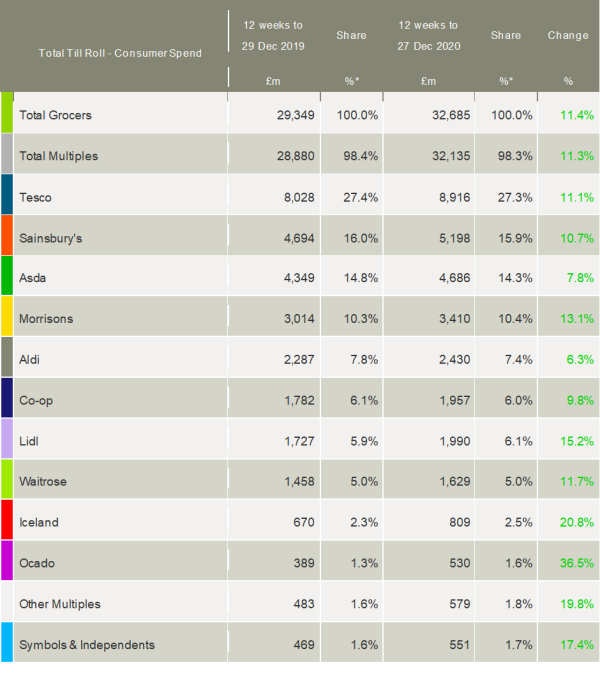Latest industry data from Kantar shows December was the busiest month ever for British supermarkets as tightening restrictions and the closure of the hospitality sector across most of the country meant shoppers spent £11.7bn on take-home groceries in the final four weeks of 2020.
Meanwhile, over the 12 weeks to 27 December, a period spanning both the November national lockdown and Christmas, take-home grocery sales surged up 11.4%
Fraser McKevitt, head of retail and consumer insight at Kantar, commented: “December is always an incredibly busy time for supermarkets, but take-home grocery shopping is usually supplemented by celebrations in restaurants, pubs and bars – with £4bn spent on food and drink, excluding alcohol, out of the home during the normal festive month. This year, almost all those meals were eaten at home and retailers stepped up monumentally to meet the surge in demand.”
The Government’s announcement of tighter restrictions across much of the country coincided with freight delays at Dover and ongoing Brexit trade deal negotiations in the final days before Christmas. McKevitt said: “Uncertainty around a deal and images of lorries sat at Dover meant consumers shopped earlier than usual and Monday 21 December was the busiest shopping day of the year. Fifteen million households, more than half the entire population, visited a grocer at some point that day and spent a collective £819m. This is a real step-change from recent years when consumers have typically completed their ‘big shop’ closer to Christmas Day.”
However, restrictions on Christmas gatherings meant that overall spending on festive dinner staples was muted with growth well behind the market at 4%. Kantar’s data showed six and a half million households still bought a turkey for roasting during December, a similar number to last year, but spend on whole birds was down 5% and some seized the opportunity to mix it up, with sales of pork roasting joints increasing by 19%, fresh fish by 20% and whole chickens by 7%.
“While celebrations may have been more low key, there were also signs of consumers keeping merry and indulging after a tough year,” said McKevitt. Cheese sales were found to have increased by 17% and chilled deserts by 15%, while shoppers also treated themselves to the supermarkets’ premium own label ranges, driving record monthly sales of £584m, £74m more than last December. Meanwhile, with options to drink in pubs, bars and restaurants limited, alcohol sales in supermarkets rose by £310m,
Online shopping remained a key feature during the Christmas period, with digital orders accounting for 12.6% of grocery spend during December, compared with only 7.4% last year. With sales over the past 12 weeks rising by 36.5%, Ocado finished the year as it started – the UK’s fastest-growing retailer. “This impressive growth has come despite only selling to less than 3% of households and is driven by the loyalty of its customers, who buy more than half their groceries through the retailer,” said McKevitt.
Rounding out a year of strong performance for frozen food, Iceland achieved growth of 20.8%. While the freezer aisles account for 39% of Iceland sales, its performance was bolstered by other parts of the store like fresh fruit, vegetables and confectionery.
Tesco’s sales rose by 11.1% year-on-year, driven by the continued success of its premium Finest brand, which found its way into more than a quarter of shopping baskets during the 12 weeks. Meanwhile, sales at Sainsbury’s increased by 10.7% and at Asda by 7.8%, with shares standing at 15.9% and 14.3% respectively.
Sales at Morrisons increased by 13.1% with its market share moving up by 0.1 percentage points to 10.4% – its highest level since June 2019.
Boosted by a voucher offer, which encouraged shoppers to spend more than £40, sales at Lidl increased by 15.2% and it gained 0.2 percentage points of market share. However, Aldi’s performance remained comparatively weak with its sales increasing by only 6.3% and its market share sliding back to 7.4% as some shoppers returned to the Big Four supermarket multiples during the pandemic.
Meanwhile, Kantar’s data showed that grocery inflation stood at just 1.3% for the 12-week period as stores battled for customers. Prices rose fastest in categories such as canned colas, fresh pork and chilled deserts, while falling in vegetables, fresh beef and bread.

NAM Implications:
- These industry results place Aldi’s 10% performance in context.
- Worth also keeping in mind that consumers were enjoying a final celebration…
- …before knuckling down to payback time in 2021…
- Key will be the extent to which your sales by customer compared.




